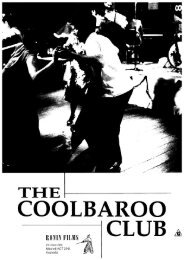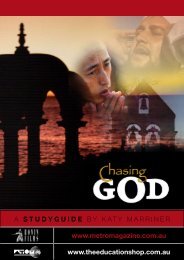to download BETELNUT BISNIS study guide - Ronin Films
to download BETELNUT BISNIS study guide - Ronin Films
to download BETELNUT BISNIS study guide - Ronin Films
Create successful ePaper yourself
Turn your PDF publications into a flip-book with our unique Google optimized e-Paper software.
filmmakers, a role he often carried out<br />
by working with them on projects in<br />
which they had considerable initiative.<br />
Owen’s own films have varied from<br />
carefully observed ethnographic films<br />
and contemporary documentaries <strong>to</strong><br />
the feature film Tukana, made on Bougainville<br />
with a cast which was speaking<br />
Tok Pisin and was new <strong>to</strong> film. Over<br />
the last twenty years most serious filmmakers<br />
who have gone <strong>to</strong> Papua New<br />
Guinea have called on Owen for advice<br />
and they have used his expertise and<br />
local knowledge, giving him work as an<br />
additional cameraman, sound recordist<br />
or edi<strong>to</strong>r. Apart from Tukana, another<br />
award-winning film by Chris Owen is<br />
Man without Pigs (1990), and again Andrew<br />
Pike worked with him on that film.<br />
In contrast <strong>to</strong> Betelnut Bisnis, Man<br />
without Pigs is about a Papua New<br />
Guinean, John Waiko, who has a doc<strong>to</strong>rate<br />
from the Australian National University<br />
and went on <strong>to</strong> become Minister<br />
for Education in the Papua New Guinea<br />
parliament. But Man without Pigs<br />
places John in his home village, where<br />
other skills, knowledge and wealth are<br />
significant.<br />
Chris Owen said in a recent interview<br />
for the press statement that accompanied<br />
the release of Betelnut Bisnis:<br />
I’m sure … that my presence with a<br />
camera influenced some events, but I<br />
was embedded in the process, and I<br />
just show what we did on a day-<strong>to</strong>-day<br />
basis—which included the making of<br />
this film. So essentially the camera is<br />
there and I’m there. I’m in the film, a<br />
participant observer, <strong>to</strong> use a phrase<br />
that I like.<br />
Chris Owen does not confront those<br />
he films, either with his camera or his<br />
questions. The camera is rarely hard<br />
up on the face of those interviewed;<br />
more often Chris takes a longer shot so<br />
that we see people in what <strong>to</strong> them are<br />
familiar surroundings. While he avoids<br />
<strong>to</strong>ugh questions, Owen’s technique encourages<br />
his informants <strong>to</strong> reveal more<br />
about themselves and their hopes and<br />
values than they would under <strong>to</strong>ugh<br />
interrogation. He makes no overt comments<br />
on the behaviour or values of<br />
Lukas and others, but the information<br />
is there in words and images for the<br />
viewers <strong>to</strong> draw their own conclusions.<br />
Because of Owen’s technique and<br />
because we have been led <strong>to</strong> an understanding<br />
of the material conditions and<br />
culture in which his interviewees live,<br />
any critical judgments are likely <strong>to</strong> be<br />
sympathetic rather than hostile.<br />
At the end of Betelnut Bisnis, Chris<br />
Owen reconsiders where he should<br />
work as a filmmaker; this film marks a<br />
significant moment in his life and in the<br />
his<strong>to</strong>ry of film in Papua New Guinea.<br />
Language<br />
There are many varieties of Pidgin<br />
English throughout the world, and<br />
those spoken in Papua New Guinea,<br />
the Solomons, Vanuatu and parts<br />
of Australia have significant differences.<br />
In Papua New Guinea there are<br />
over 700 different languages; no one<br />
Indigenous language is spoken by ten<br />
per cent of the population; and many<br />
are spoken by less than one per cent.<br />
There is a further complication: some<br />
languages are completely unrelated or<br />
only distantly related. Once Papua New<br />
Guineans from different places began<br />
meeting they were in need of a lingua<br />
franca.<br />
Papua New Guinea Pidgin or Tok Pisin<br />
(from ‘Talk Pidgin’) developed along<br />
the north coast of the mainland and in<br />
ISSUE 36 SCREEN EDUCATION<br />
5



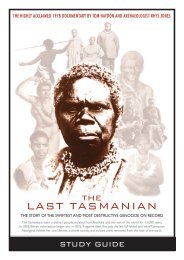
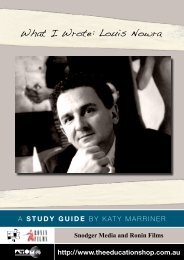
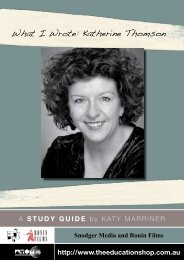
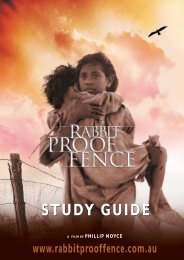
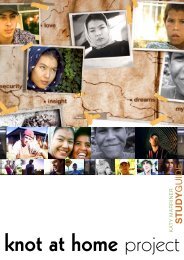
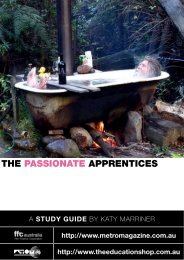
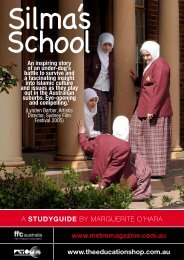
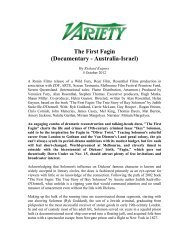
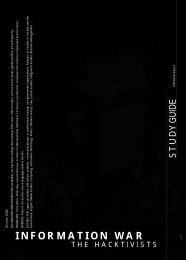
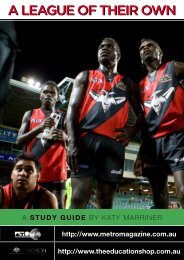
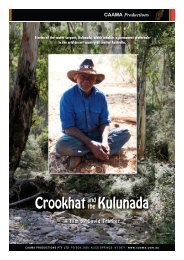
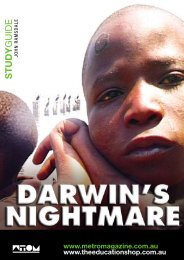
![to download FROHE OSTERN! [HAPPY EASTER!] - Ronin Films](https://img.yumpu.com/33740736/1/184x260/to-download-frohe-ostern-happy-easter-ronin-films.jpg?quality=85)
